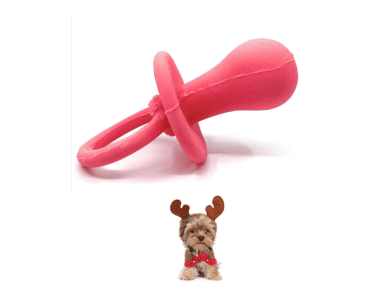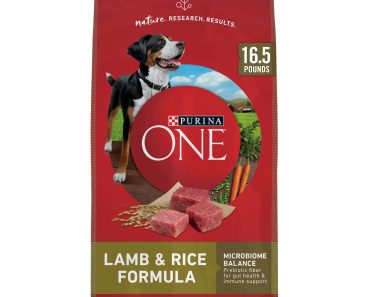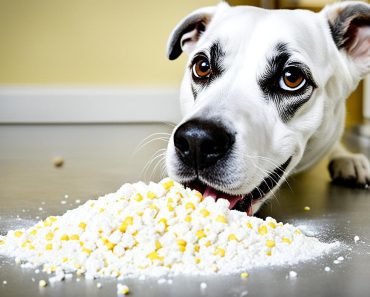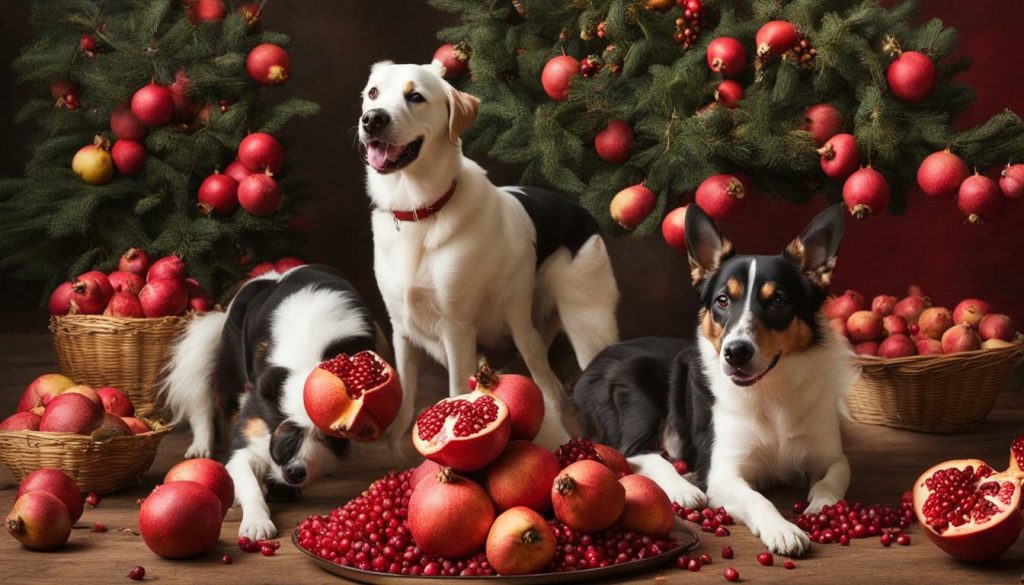
Many pet owners wonder, can dogs safely consume pomegranates? While pomegranates themselves are not toxic to dogs, it is important to understand the risks associated with their consumption. It’s crucial to avoid letting dogs eat the rind, stem, or seeds of the pomegranate, as these parts can cause gastrointestinal issues, such as diarrhea and vomiting. Additionally, the rind and stem can pose a risk of obstruction, especially in smaller dogs.
Key Takeaways:
- Pomegranate seeds can cause gastrointestinal issues in dogs, including diarrhea and vomiting.
- The rind and stem of pomegranates can cause obstruction, particularly in smaller dogs.
- If your dog accidentally consumes pomegranate, monitor for signs of illness and consult a veterinarian if necessary.
- Pomegranate extract can benefit dogs in the proper dosage, but using products specifically manufactured for dogs and avoiding artificial sweeteners like xylitol is important.
- Other safe dog fruits include bananas, plums, oranges, strawberries, and watermelon.
Always consult your veterinarian before introducing new foods into your dog’s diet to ensure their overall health and well-being.
The Benefits and Risks of Feeding Pomegranates to Dogs
Pet owners should know that feeding pomegranates to dogs can have benefits and risks. While pomegranates are not toxic to dogs, certain parts should be avoided to prevent potential health issues. Pomegranate seeds, for example, can cause gastrointestinal problems such as diarrhea and vomiting. Removing the seeds before offering pomegranate to your furry friend is important. Additionally, the rind and stem of the fruit can potentially lead to obstructions, especially in smaller breeds.
However, when given in moderation and prepared properly, pomegranates can also offer some health benefits to dogs. Packed with antioxidants, vitamins, and minerals, pomegranates can support the immune system and contribute to overall canine health. The fruit’s anti-inflammatory properties may help reduce inflammation and provide relief for dogs with certain health conditions.
It is crucial to note that while pomegranate extract can benefit dogs, it is essential to use products specifically manufactured for them. Avoid feeding your dog pomegranate products that contain artificial sweeteners like xylitol, as these can be toxic to dogs. Always read the labels and consult with your veterinarian if you are unsure about the safety of a particular product.
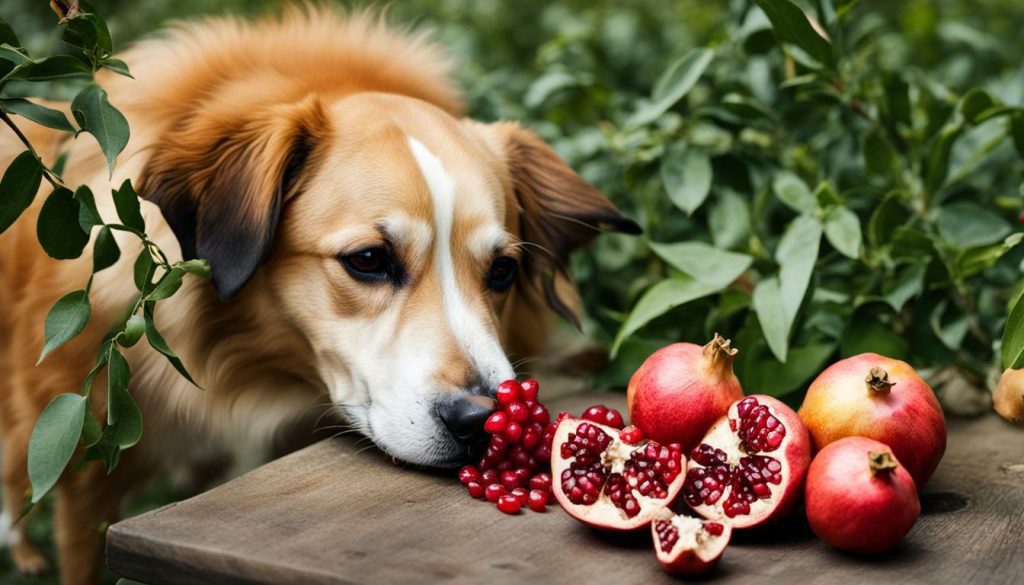
In addition to pomegranates, several other fruits are safe and healthy for dogs. Bananas, plums, oranges, strawberries, and watermelon are among the many options you can offer your furry companion as a tasty and nutritious snack. Gradually introduce new foods and monitor your dog for adverse reactions or digestive issues.
Before making any changes to your dog’s diet, it is crucial to consult with your veterinarian. They can provide personalized guidance based on your dog’s needs and health conditions. Your vet can also help determine the appropriate serving size and frequency of pomegranate or other fruits in your dog’s diet, ensuring their overall well-being and nutritional balance.
What Parts of the Pomegranate Should Dogs Avoid?
While dogs can consume pomegranates, it is crucial to understand which parts of the fruit should be avoided to prevent potential health issues. Feeding guidelines for dogs and pomegranates recommend refraining from giving dogs the fruit’s rind, stem, and seeds. These parts can pose various risks, especially for smaller dogs.
Pomegranate seeds, although small, can cause gastrointestinal issues in dogs, such as diarrhea and vomiting. Removing the seeds before offering pomegranate to your furry friend is best. Additionally, the rind and stem of the fruit can cause obstruction, particularly in smaller dogs, as these parts are harder to digest and can lead to choking or intestinal blockages.
If you suspect your dog has accidentally consumed pomegranate seeds, rind, or stem, monitoring their behavior and watching for any signs of illness is essential. Common symptoms of pomegranate toxicity in dogs may include decreased appetite, lethargy, or abdominal discomfort. If any concerning symptoms arise, it is advisable to consult with a veterinarian to ensure your dog’s well-being.
Precautions for Feeding Pomegranates to Dogs
When introducing pomegranates into your dog’s diet, it is important to take precautions to ensure their safety. Always remove the seeds and avoid giving your dog the rind or stem. Furthermore, it is crucial to note that pomegranate juice should also be avoided, as it contains a concentrated amount of sugar and lacks the natural fiber in the fruit.
| Fruit | Can Dogs Have It? |
|---|---|
| Bananas | Yes |
| Plums | Yes, but remove the pit. |
| Oranges | Yes, in moderation. Avoid the peel. |
| Strawberries | Yes, in moderation. |
| Watermelon | Yes, remove the seeds and rind. |
While dogs should consume pomegranates in moderation, numerous other fruits can safely be enjoyed. Bananas, plums (without the pit), oranges (without the peel), strawberries, and watermelon (without the seeds and rind) are just a few examples of fruits that are considered safe for canine consumption. However, it is always important to introduce new foods gradually and consult with your veterinarian to ensure they align with your dog’s dietary needs.

Consumption of pomegranate seeds can lead to gastrointestinal problems in dogs and should be cautiously approached. While pomegranates are generally safe for dogs to eat, it is important to be aware of the potential risks that can arise from feeding them this fruit.
When ingested by dogs, pomegranate seeds can cause gastrointestinal distress, such as diarrhea and vomiting. The high fiber content of these seeds can be difficult for dogs to digest, leading to stomach upset. Additionally, the seeds’ hard texture can potentially cause obstructions in the digestive tract, especially in smaller dogs.
It is crucial to monitor your dog’s behavior and health after they have consumed pomegranate seeds. If you notice any signs of discomfort, such as abdominal pain or persistent vomiting, it is recommended to seek veterinary assistance immediately. Prompt medical intervention can help alleviate the symptoms and prevent any further complications.
As with any new food introduced into a dog’s diet, it is always wise to consult your veterinarian beforehand. They can provide personalized advice based on your dog’s specific health needs and recommend suitable alternatives if pomegranates pose a risk to your pet’s well-being.
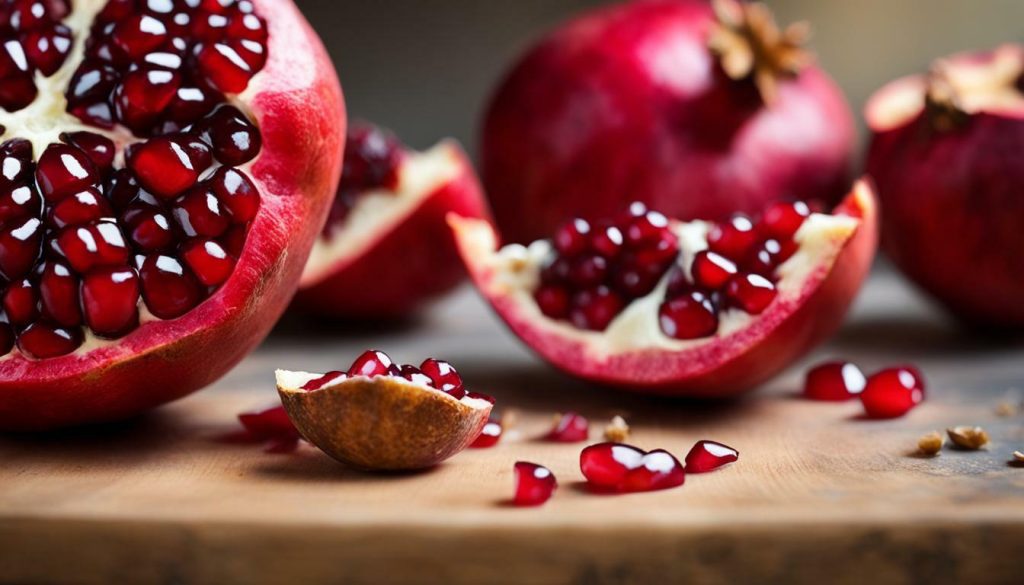
| Fruits Safe for Dogs | Benefits |
|---|---|
| Bananas | Rich in potassium and fiber |
| Plums | Provide vitamins A and C |
| Oranges | High in vitamin C and antioxidants |
| Strawberries | Contains vitamins and beneficial antioxidants |
| Watermelon | Hydrating and low in calories |
While pomegranates may offer certain health benefits to dogs when consumed in moderation, it is important to exercise caution and prioritize their well-being. Stick to safe alternatives like bananas, plums, oranges, strawberries, and watermelon, which provide essential nutrients without the potential risks.
What to Do If Your Dog Accidentally Consumes Pomegranate
If your dog accidentally consumes pomegranate, it is important to take certain steps to ensure their well-being. While pomegranates are not toxic to dogs, certain parts of the fruit can cause gastrointestinal issues and potential obstruction, especially in smaller dogs.
The first step is to monitor your dog for any signs of illness. Watch for symptoms such as diarrhea, vomiting, abdominal pain, or difficulty defecating. If any of these symptoms occur, it is crucial to contact your veterinarian immediately for guidance.
In the meantime, you can try to induce vomiting in your dog if the ingestion occurs within the past two hours and your veterinarian approves. This can help remove any remaining pomegranate from their system. However, it is important to follow your veterinarian’s instructions carefully and not attempt this without their guidance.
| Steps to Take If Your Dog Accidentally Consumes Pomegranate: |
|---|
| Monitor for signs of illness such as diarrhea, vomiting, abdominal pain, or difficulty defecating. |
| Contact your veterinarian immediately if any symptoms occur. |
| Follow your veterinarian’s guidance on inducing vomiting if approved and within the appropriate timeframe. |
| Do not induce vomiting without professional guidance. |
Remember, prevention is always the best approach. Keep pomegranates and their parts out of your dog’s reach to avoid accidental ingestion. If you have any concerns or questions about feeding your dog pomegranates or any other foods, consult your veterinarian for personalized advice and guidance.
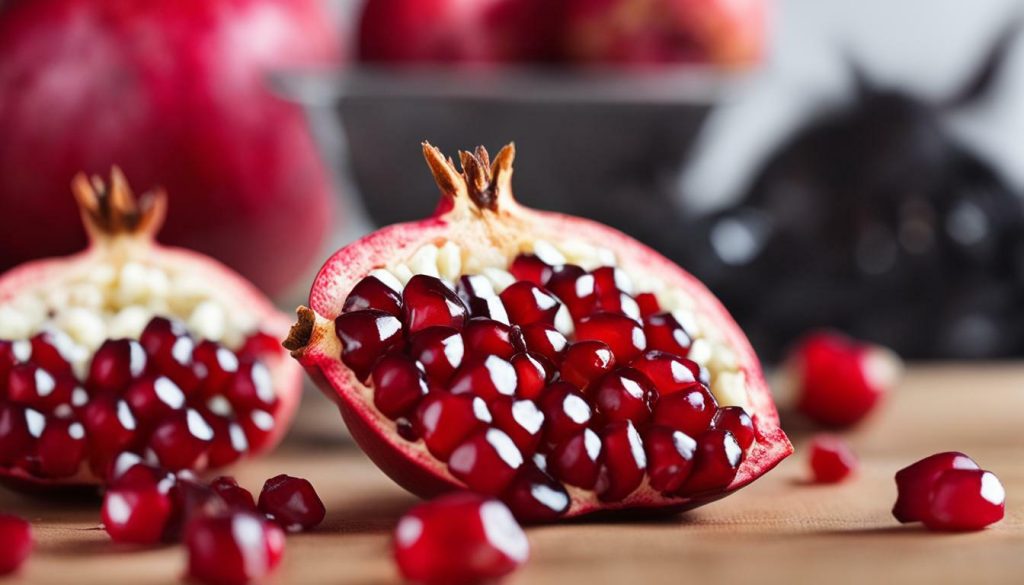
Pomegranate extract can provide various health benefits for dogs, but it is essential to understand the right dosage and suitable products for their well-being. Packed with antioxidants, pomegranate extract can help boost the immune system and protect against oxidative stress. It is also known to have anti-inflammatory properties, which can aid in reducing inflammation and promoting overall joint health in dogs.
Additionally, pomegranate extract has been found to support cardiovascular health by improving blood flow and reducing the risk of heart disease. The high levels of vitamins and minerals in pomegranate extract can contribute to maintaining healthy skin and a shiny coat in dogs.
When considering pomegranate extract for your furry friend, it is crucial to consult with your veterinarian. They can guide you in determining the appropriate dosage based on your dog’s size, age, and overall health. It is also important to ensure that you are using products specifically designed for dogs and free from artificial sweeteners like xylitol, which can be toxic to dogs.
Pomegranate Extract Dosage Guidelines for Dogs:
| Dog’s Weight | Recommended Pomegranate Extract Dosage |
|---|---|
| Small (up to 20 lbs) | 1/4 teaspoon daily |
| Medium (20-50 lbs) | 1/2 teaspoon daily |
| Large (50+ lbs) | 1 teaspoon daily |
Remember, moderation is key when introducing any new supplement or food into your dog’s diet. While pomegranate extract can provide health benefits, it should always be given in appropriate amounts and consultation with your veterinarian. By taking these precautions and considering your dog’s specific needs, you can ensure their overall well-being and incorporate the benefits of pomegranate extract into their daily routine.

If you want to diversify your dog’s fruit intake, there are other safe options for them to enjoy apart from pomegranates. These fruits provide a tasty treat and offer various health benefits for your canine companion.
“Feeding fruits to dogs can be a great way to add essential vitamins, minerals, and fiber to their diet,” says Dr. Smith, a veterinarian with over 10 years of experience. “However, it’s important to introduce new foods gradually and in moderation to prevent any digestive upset.”
One popular fruit that dogs tend to love is bananas. High in potassium and fiber, bananas can help support healthy digestion and heart function in dogs. Remove the peel and feed them in small, bite-sized pieces to prevent choking hazards.
Another safe fruit for dogs is plums. These juicy fruits provide a good source of vitamins A and C, which can boost your dog’s immune system. Remember to remove the pits before feeding plums to your furry friend, as they can pose a choking hazard.
| Fruit | Benefits |
|---|---|
| Bananas | High in potassium and fiber |
| Plums | Rich in vitamins A and C |
| Oranges | Loaded with vitamin C and antioxidants |
| Strawberries | Contain antioxidants and fiber |
| Watermelon | Hydrating and a great source of vitamins A and C |
Oranges are another safe fruit option for dogs. Packed with vitamin C and antioxidants, oranges can help support a healthy immune system and promote collagen production in your furry friend. Remove any seeds and the white pith before offering them a slice.
Strawberries are a sweet and nutritious treat for dogs. They are rich in antioxidants and fiber, which can support overall health and digestion. When feeding your dog strawberries, remove the stems and cut them into small, manageable pieces.
Watermelon is another safe fruit that dogs can enjoy. It is hydrating and contains vitamins A and C. Remove the seeds and rind, and offer your dog small, seedless pieces as an occasional summer treat.
Remember, although these fruits are safe for dogs to consume, it’s essential to introduce them in moderation and observe your dog for any adverse reactions. If you have any concerns about your dog’s diet or health, always consult a veterinarian before making any changes.

Before including pomegranates or any other new food in your dog’s diet, it is crucial to consult with your veterinarian to ensure it aligns with their specific dietary needs. While pomegranates are generally not toxic to dogs, certain parts of this fruit can harm their health.
Pomegranate seeds, for example, may cause gastrointestinal issues such as diarrhea and vomiting if consumed in large quantities. Additionally, the rind and stem of the pomegranate can cause obstructions, particularly in smaller dogs. Therefore, keeping these parts out of reach and avoiding feeding them to your furry friend is essential.
Regarding pomegranate extract, it can potentially benefit dogs in the right dosage. However, it is vital to use products specifically manufactured for dogs and avoid those containing artificial sweeteners like xylitol, which can be toxic to canines.
As with any new food, it is always best to introduce it gradually and monitor your dog’s reaction. If you notice any signs of illness or discomfort after you consume pomegranates, it is crucial to consult with your veterinarian for guidance and advice.
Remember, your veterinarian knows your dog’s health history and individual needs best. They can provide personalized recommendations and ensure that new foods, including pomegranates, are suitable and safe for your furry companion.

| Benefits of Consulting with a Veterinarian | Considerations Before Feeding Pomegranates to Dogs |
|---|---|
|
|
Conclusion
In conclusion, while dogs can consume pomegranates, it is important to be mindful of the various risks and guidelines to ensure their well-being. While pomegranates are not toxic to dogs, it is crucial to avoid letting them eat the rind, stem, or seeds.
Pomegranate seeds can cause gastrointestinal issues such as diarrhea and vomiting, which can be uncomfortable for our furry friends. Additionally, the rind and stem can pose a risk of obstruction, especially for smaller dogs. Therefore, removing these parts before offering pomegranates to your canine companion is best.
If your dog accidentally consumes pomegranate, monitoring them for any signs of illness is essential. If they experience any adverse effects or if you have any concerns, it is always wise to consult with a veterinarian for further guidance.
While pomegranate extract can have potential benefits for dogs, it is crucial to use products specifically manufactured for dogs and avoid those containing artificial sweeteners like xylitol, as these can be harmful to our pets.
Remember, there are plenty of other safe fruits that dogs can enjoy, such as bananas, plums, oranges, strawberries, and watermelon. However, it is always important to consult with your veterinarian before introducing any new foods into your dog’s diet, as they can provide personalized advice based on your dog’s specific dietary needs and health conditions.
FAQ
Can dogs safely eat pomegranates?
While pomegranates are not toxic to dogs, it is important to avoid letting them eat the rind, stem, or seeds.
What parts of the pomegranate should dogs avoid?
Dogs should avoid consuming the rind, stem, and seeds of a pomegranate.
What are the potential gastrointestinal issues from pomegranate consumption?
Pomegranate seeds can cause gastrointestinal issues such as diarrhea and vomiting in dogs.
What should I do if my dog accidentally consumes pomegranate?
Monitor your dog for signs of illness and consult a veterinarian if necessary.
Can dogs have pomegranate juice?
It is not recommended to feed dogs pomegranate juice.
What are the benefits of pomegranate extract for dogs?
Pomegranate extract can be beneficial for dogs when used in the proper dosage and with products specifically manufactured for dogs.
What other fruits are safe for dogs to enjoy?
Other safe fruits for dogs include bananas, plums, oranges, strawberries, and watermelon.
Should I consult with a veterinarian before introducing new foods to my dog’s diet?
Yes, it is always important to consult with a veterinarian before introducing new foods into your dog’s diet.



